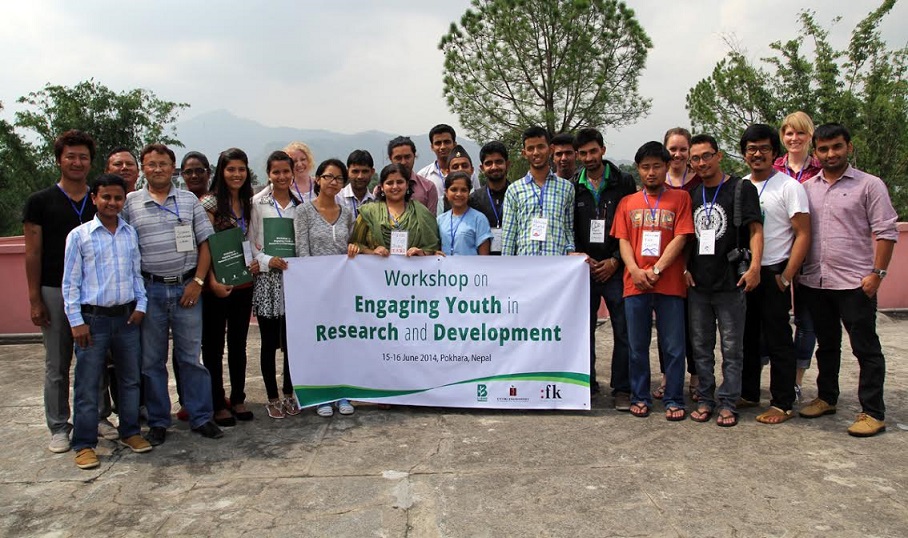-
About
- Our Work
- Get Involved
- Stay Updated
Promoting Youth Engagement: Setting the scene
 Nepalese youth has played an immense role in the political transformation of the country many times; however, their issues are repeatedly unaddressed. Youth represents 38.8% (National Youth Policy, 2010) of the total population of the country, which is a big number considering the fact that young people are the ones to shape the nation’s future. Even though Nepal has very little experience in the research sector to ensure a sustainable development, there are few silver linings where youngsters are striving to develop their careers in the research and development fields, particularly within the Agriculture, Biodiversity and Climate change sectors.
Nepalese youth has played an immense role in the political transformation of the country many times; however, their issues are repeatedly unaddressed. Youth represents 38.8% (National Youth Policy, 2010) of the total population of the country, which is a big number considering the fact that young people are the ones to shape the nation’s future. Even though Nepal has very little experience in the research sector to ensure a sustainable development, there are few silver linings where youngsters are striving to develop their careers in the research and development fields, particularly within the Agriculture, Biodiversity and Climate change sectors.Considering these facts, Local Initiatives for Biodiversity Research and Development (LI-BIRD) took the initiative to organize the Workshop on “Engaging Youth in Research and Development”, 15-16 June 2014, in Pokhara, Nepal, by bringing young people from different youth organizations to examine how youth, research and development sectors can utilize each other's knowledge, skills and challenges to create a greater impact and to pinpoint the possible collaboration among the youth organizations.
The two days workshop was divided in three parts: Success story presentation, World Cafe session and Motivation session.
Success story presentation
Participants from 9 different organizations came together and presented their stunning success stories. Cycle Journey for the dissemination of Climate change message by UNC, Climate change Conference by NYCA, Biodynamic farming by YFN, Youth involvement in Environment Conservation and REDD+ by YAE, Story on National Food Activism by NEFTSA, Mushroom Cultivation and Use of ICTs in Agriculture by YPARD Nepal and Ombudsman for Future Generation by SPIRE were the success stories presentations.
Group discussion and World Cafe session
During the group discussion session, the participants brainstormed on sustainability of the food system, entrepreneurship, research and development based on the development voyage. Then, the five groups discussed on five eminent questions in the World Cafe session, which were:
- What is the situation today on youth involvement in research and development work in Nepal?
- What is the situation today on youth work in research and development in climate change?
- Why to involve youth in research and development?
- What kind of activities can youth do in research and development projects?
- How can research and development organisations best facilitate for youth involvement?
Motivation Session
During this session, a youngster called Tulsi Giri made an inspiring and encouraging presentation on the bazaar initiative (‘bazaar’ means ‘market’ in Nepalese language), which is based on organic farming, green living and agricultural entrepreneurship. As Tulsi explained, the bazaar initiative aims to integrate farmers, policy makers, consumers and stakeholders, and it focuses on Participatory Guarantee System (PGS), the third party certification based upon participation and trust. Likewise, it consists of four strategic working areas: the bazaar connects urban consumers with local organic products, the Bazaar cooperative deals with organic production and agribusiness, Sathi ko bio farm helps in training and agro-tourism and the Organic living helps in agro-tourism.
Ganesh Sharma, a young Government school teacher who attended the workshop as a guest speaker, also shared his experiences in the field of education, development and all his milestone initiatives. His story not only did it make the participants realize the ground level challenges but also inspired them with his stunning quotes that stressed in concerted efforts to make the real difference.
Conclusions
The event has provided the opportunity to the participants to learn from each other's success stories as well as to encourage them to carry out small actions that can cause a great impact. As youth is synonym to innovation and creativity, we highlighted the huge gap between support system and specific action which can be reduced by the multi-stakeholder’s collaboration and support. Moreover, the attendees also underlined the importance of capacity building as the most essential factor to enhance the youth’s skills and imagination. To sum up, LI-BIRD’s initiative could address the different tabled issues to shape the future of sustainable development in Nepal as well as to engage the youth in the strategic planning level.
The best way to unleash the capacities, imagination and creativity of the youth is to make their voices heard!
Click here to watch the full video of the workshop, made by LI-BIRD.
Picture credit by Bivekananda Mahat.
About the author
Related Posts
Comments
No comments made yet. Be the first to submit a commentBy accepting you will be accessing a service provided by a third-party external to https://www.ypard.net/
Get in touch
Email: [email protected]
YPARD Global Coordination UnitHosted by AGRIDEA and the Czech University of Life Sciences Prague
Lausanne, Switzerland and Prague, Czech Republic - Our Work

 Nepalese youth has played an immense role in the political transformation of the country many times; however, their issues are repeatedly unaddressed.
Nepalese youth has played an immense role in the political transformation of the country many times; however, their issues are repeatedly unaddressed. 